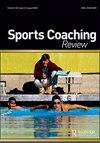Gendered microaggressions towards the “only” women coaches in high-performance sport
IF 2.6
Q2 HOSPITALITY, LEISURE, SPORT & TOURISM
引用次数: 13
Abstract
ABSTRACT For women, being underrepresented in high-performance sport coaching is endemic. They also often report a sense of minoritisation, and incidents of discrimination. The purpose of the present study was to understand, using a gender-microaggressions perspective, how sexism manifests for women in elite coaching who report to be the “only” woman in their context, how they respond to such experiences, and how such discrimination is enabled. Through interviews with nine high-performance female head coaches globally, the prevalent type of microaggressions experienced were gendered microinvalidations. But findings also demonstrate that these women attempted to resist sexism. Nevertheless, being the “only” women restricted their resistance because they could not form collective power that led to transformations in the coaching culture. More action is required to build critical, evenly distributed masses of women across the coaching pathway. Future research must also address the features of organisational contexts that provide fertile grounds for exclusionary cultures.针对高性能运动中“唯一”女性教练的性别微侵犯
对于女性来说,在高性能体育教练中代表性不足是一种普遍现象。他们也经常报告一种被边缘化的感觉,以及受到歧视的事件。本研究的目的是利用性别微侵犯的视角,了解在精英教练中,那些自称是“唯一”女性的女性是如何表现出性别歧视的,她们如何应对这种经历,以及这种歧视是如何产生的。通过对全球9位高绩效女性主教练的访谈,我们发现女性所经历的微侵犯类型主要是性别微失能。但研究结果也表明,这些女性试图抵制性别歧视。然而,作为“唯一”的女性限制了她们的反抗,因为她们无法形成集体力量,从而导致教练文化的转变。需要采取更多的行动,在整个教练路径上建立起关键的、均匀分布的女性群体。未来的研究还必须解决为排他性文化提供肥沃土壤的组织背景的特征。
本文章由计算机程序翻译,如有差异,请以英文原文为准。
求助全文
约1分钟内获得全文
求助全文

 求助内容:
求助内容: 应助结果提醒方式:
应助结果提醒方式:


